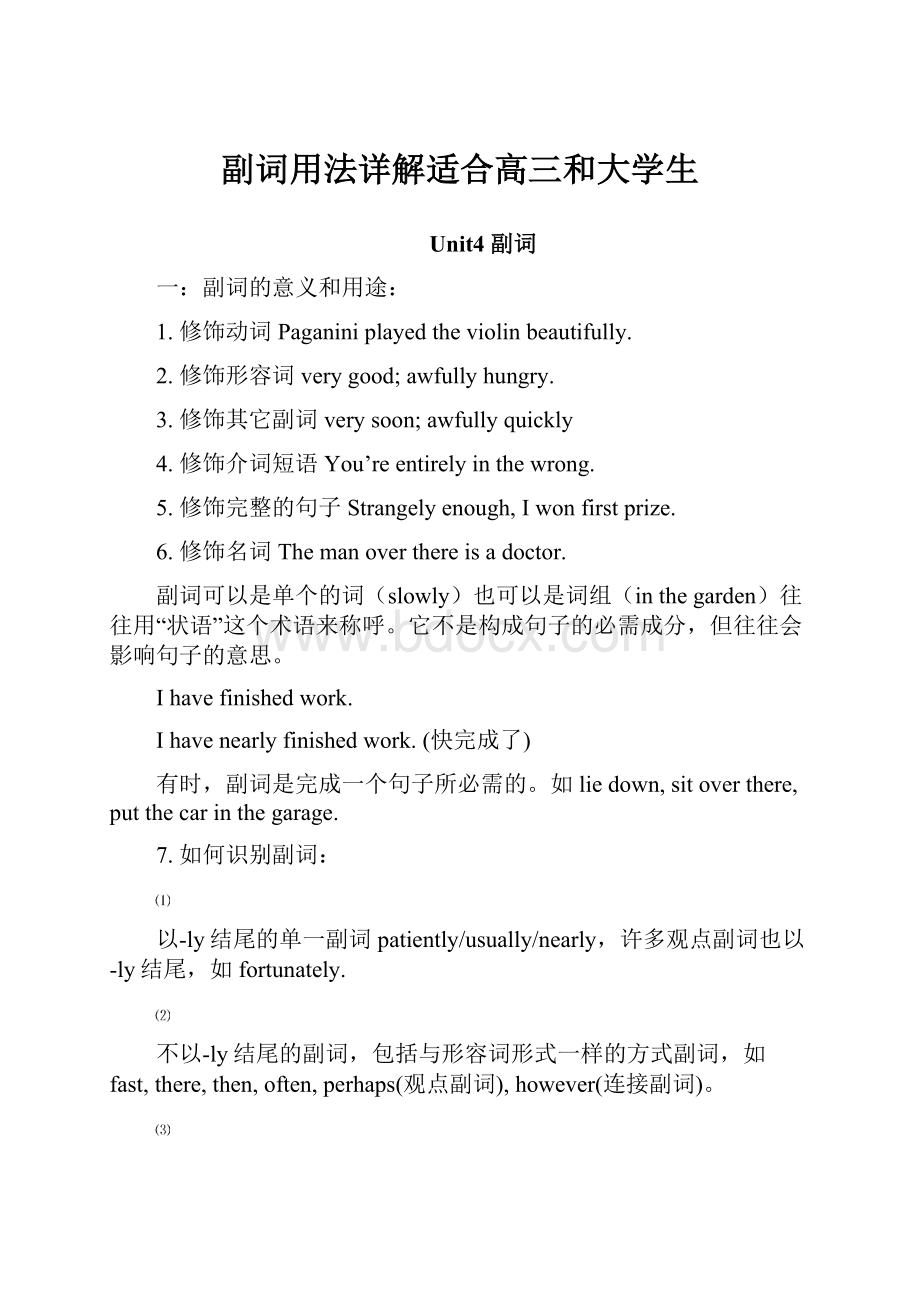副词用法详解适合高三和大学生.docx
《副词用法详解适合高三和大学生.docx》由会员分享,可在线阅读,更多相关《副词用法详解适合高三和大学生.docx(26页珍藏版)》请在冰豆网上搜索。

副词用法详解适合高三和大学生
Unit4副词
一:
副词的意义和用途:
1.修饰动词Paganiniplayedtheviolinbeautifully.
2.修饰形容词verygood;awfullyhungry.
3.修饰其它副词verysoon;awfullyquickly
4.修饰介词短语You’reentirelyinthewrong.
5.修饰完整的句子Strangelyenough,Iwonfirstprize.
6.修饰名词Themanoverthereisadoctor.
副词可以是单个的词(slowly)也可以是词组(inthegarden)往往用“状语”这个术语来称呼。
它不是构成句子的必需成分,但往往会影响句子的意思。
Ihavefinishedwork.
Ihavenearlyfinishedwork.(快完成了)
有时,副词是完成一个句子所必需的。
如liedown,sitoverthere,putthecarinthegarage.
7.如何识别副词:
以-ly结尾的单一副词patiently/usually/nearly,许多观点副词也以-ly结尾,如fortunately.
不以-ly结尾的副词,包括与形容词形式一样的方式副词,如fast,there,then,often,perhaps(观点副词),however(连接副词)。
副词短语,表示方式、地点和时间的副词短语常用介词+名词构成,如inahurry/inthegarden/atthestation;其它的副词还有againandagain(频度),hardlyatall(程度副词),verymuchindeed(thankyouverymuchindeed),asamatteroffact,inthatcase。
副词小品词,有些介词如in,off,up也可以做副词小品词
Thechildrenareinthehouse.
Thechildrenhavejustgonein.
二:
副词比较级/最高级:
只有可分级副词才有比较级和最高级。
Daily/extremely/only/really/then/there/uniquely等不可以分级,所以没有比较级。
副词比较级最高级
1.与形容词同形fastfasterfastest
2.以-ly结尾的方式副词easilymoreeasilymosteasily
3.某些频度副词rarelymorerarelymostrarely
4.例外badlyworseworst
farfartherfarthest
furtherfurthest
latelaterlatest
littlelessleast
muchmoremost
wellbetterbest
说明:
1.频度副词用more/most/less/least构成比较级和最高级,如moreseldom/mostseldom;often可用moreoften也可用oftener(不常用)。
2.latest/last:
都可以做形容词
Iboughtthelatest(mostrecent)editionoftoday’snewspaper.(最近的)
Iboughtthelast(final)editionoftoday’snewspaper.(最后的)
但是一般只有last能做副词:
Itwasadifficultquestion,soIansweredlast.
也可以把last放在主要动词之前:
Itlastrainedeightmonthsago.(=Thelasttimerainedwas----.)
3.farther/further都可以指距离:
Wedrovetenmilesfarther/furtherthannecessary.
但只有further能够表示“此外”
Welearnt,further,thathewasn’taqualifieddoctor.
三:
如何用副词比较
1.as---as
Sylviasingsassweetlyashersister.
notas/so---as
Ican’tswimaswellasyou(can).
Shecan’tjump(quite)sohighasBilly(can).
3.---than
Theraincleared(停止)morequicklythanIexpected.
4.the---the---(越---,越---)
ThefasterItype,themoremistakesImake.
5.---and---
Itrainedmoreandmoreheavily.
6.比较级DavedrivesfasterthananyoneIknow.
7.最高级IworkfastestwhenIamunderpressure.
Timtriesthehardestofalltheboysintheclass.
我们常用比较级+thanever//thananyone//thananything
Magnusconcentratedharderthanever//thananyone.
四:
方式副词
1.构成:
在形容词后加-ly:
bad-badly;careful-carefully
以辅音+y结尾时。
把y变为-ily:
happy-happily;busy-busily;funny-funnily;但是dry-drily/dryly;sly-slyly
以-le结尾时,去掉-e,改为-ly:
noble-nobly;able-ably;nimble-nimbly;possible-possibly;但是whole-wholly,其它的以-e结尾的则保留-e加-ly:
extreme-extremely;tame-tamely;但due-duly;true-truly除外。
形容词结尾为-ic时,须加上-ally:
fantastic-fantastically;basic-basically;systematic-systematically;但是public-publicly是例外。
而且,有些以-ly结尾的副词(与方式/频度有关)与形容词同形,如daily/weekly/quarterly/yearly
Ireceivequarterlybills.Ipaymybillquarterly.
Early既是形容词也是副词
Ihopetocatchanearlytrain.Iwanttoarriveearly.
以-l结尾需要双写l:
beautiful-beautifully;
其它后缀,如backwards,forwards,northwards,upwards(都表示方向);crossways,lengthways(=lengthwise纵向地),sideways;clockwise,lengthwise,moneywise(-wise构成“与–有关地”副词)
Howdoyoumanagetaxwise?
(税收方面你怎么处理?
)
Thesmokecurledupwards.
Takeastepsideways.
Thetableswerelaidlengthways.
大多数方式副词修饰动作动词laughloudly;performbadly;drivecarefully,但是,较少量的方式副词也可以修饰状态动词understandperfectly;knowwell.
注意:
以下-ly都是形容词:
brotherly/sisterly/cowardly/elderly(稍老的anelderlyman)/(un)friendly/heavenly(Thesun,moonandstarsareheavenlybodies)/likely(thelikelyoutcome//Sheisverylikelytoringmetonight;也可adv:
notlikely//aslikelyasnot说不定)/unlikely/lively/lovely/manly(lookedmanly)/womanly(atrulywomanlywoman)/motherly/fatherly/sickly(多病的asicklychild)/silly/ugly这些词常与way,manner,fashion等连用
Shealwaysgreetsinafriendlymanner/way/fashion.
2.具有两种形式的副词,二者可能:
意义相同:
Iboughtthiscarcheap/cheaply.
意义不同,如hard:
Iworkhardandplayhard.
Ididhardlyanyworktoday.
3.意义上不同于相应形容词的副词,如express(快的)/expressly(清楚地);ready/readily(毫不迟疑地、欣然地:
answerquestionsreadily//容易地:
thesofacanbereadilyconvertedintoabed//):
Ifitwasurgent,youshouldsenditbyexpressmail.
Youweretoldexpresslytobeherebyseven.
有些副词,如coldly/coolly/hotly/warmly可以表示感情和行为,可以和act/behave/react/speak等表示行为的动词连用,试比较:
Itisacolddaytoday.---Thewholequeuestaredatmecoldly.
Itwasawarm/coolday.---Emilygreetedmewarmly/coolly.
Itwasahotday.---Edwardhotly(断然地)deniedtheaccusation。
五:
副词的位置:
1.方式副词一般放在宾语或者动词后面
-放在宾语后面:
Shewatchedthemonkeycuriously.
-放在动词后面:
Itsnowedheavilylastnigh.
-在副词小品词后面:
Hetookthepicturedownverycarefully.
-重要的是不要把副词放在动词和其宾语之间
不能说HespeakswellEnglish.
但是,如果宾语较长,则可以这样做:
Wecouldseeveryclearlyastrangelightaheadofus.
2.单一的方式副词可以放在主语和动词之间,强调主语。
但是短语副词一般不这样做:
Gillianangrilyslammedthedoorbehindher.
当well/badly评估以行动时,只能放在句子或者从句的末尾:
MrGradgrindpayshisstaffverywell/badly.
有些方式副词,包括bravely,cleverly,cruelly,foolishly,generously,kindly,secretly,simply变换了位置,强调的方面也不同,试比:
较
Hefoolishlylockedhimselfout.(=Itwasfoolishthat---.)
Hebehavefoolishlyattheparty.(=inafoolishmanner)(聚会上,他举止可笑。
)
还有一些副词,包括badly,naturally,改变其位置,也会改变其意义和功能:
Youtypedthisletterverybadly.(这封信打得很糟糕。
方式副词)
3.在叙述文中,但一般不在讲话中,方式副词,如gently,quietly,slowly,suddenly可以放在句子开头,以引起悬念或者达到戏剧性的效果。
一般用逗号隔开
Oscarheldhisbreathandstoodstill.Quietly,hemovedforwardstogetabetterview.
六:
地点副词
1.地点的含义
方位:
HeisinBeijing.方位状语回答where。
常与位置动词live/be/stay/work这样的“位置动词”连用。
方位状语可以放在句子开头:
InBeijingLarrystayedatGrandHotel.
方向(去,离开):
LarrywentbyplanetoBeijing.方向状语用于回答“whereto”和“wherefrom”,常与go这类“动作动词”连用。
2.地点副词的位置:
从不位于主语和动词之间。
用在方式副词之后,时间副词之前。
Barbarareadquietly(方式副词)inthelibrary(地点副词)allafternoon.
然而,方向副词却可以在动词之后,其它副词之前
IwenttoLondon(方向副词)bytrain(方式)nextday(时间副词)。
一连串的地点副词,应该由小到大:
ShelivesinasmallhouseinavillageoutsideReadinginBerkshire,England.
3.如果要强调方位(比如为了对比),可以把表示方位的副词放在句首,特别是在叙事文中。
Indoorsitwasniceandwarm.Outsideitwassnowingheavily.
当有一个以上的地点副词时,为了避免歧义,将地点副词置于句首是常有的:
Onmanylargefarms,farmworkersliveintied(出租给雇工的)cottages.
七:
时间副词
1.表示确定时间的副词。
表示确定时间的副词,用来回答when,一般用于过去时或者将来。
Istartedmyjoblastweek.
Iwillringyoutomorrow.
表示时间的词,如today,tomorrow,yesterday等能被early/earlier/late/later修饰:
Earliertoday;late/laterthisyear.
在口语中,当指一周中的具体的某一天时,我们不用“on”
Let’smeetMonday.(formal:
Let’smeetonMonday.)HewasbornonaMonday.
(atChristmas)
表示确定时间的副词一般放在句尾。
WecheckedinatthehotelonMonday/yesterday.
表示确定时间的副词也可以置于句首:
ThismorningIhadatelephonecallfromTom.
多个时间副词的顺序也是由小到大
Gilbertwasbornat11.58onMondayNovember18th1986.
2.表示非确定时间:
afterwards,already,anotherday,anothertime,atlast,atonce,early,eventually,formerly(以前),immediately,just,late,lately(最近,近来=recently),now,nowadays,once,oneday(过去或者将来),presently,someday(指将来某一天),soon,still,subsequently,thesedays,ultimately,then,yet等。
这些时间副词一般用在句尾,动词之前,be之后
IwenttoBerlinrecently.=IrecentlywenttoBerlin.
IwasrecentlyinBerlin.
还可以用于句首引起兴趣或对比:
Recently,IwenttoBerlin.Itwasveryinteresting---.
Early和late一般用在句尾
Wewenttotheairporttooearly/lateforourflight.
Anotherday/time;oneday;someday可用于句首或者末尾:
SomedayIwilltellyou.
Iwilltellyousomeday.
有些表示非确定时间的词可以被only,very修饰,如:
onlyjust,onlyrecently;veryearly,veryrecently.
Still的用法:
表示时间的延续,主要用于肯定句和疑问句,常在助动词之后,完全动词之前。
MrMasonisstillinhospital.
TomstillworksfortheBritishCouncil.
为了表示强调,也可以在助动词之前:
Marthastillisinhospital,youknow.
在否定句中,still用在否定结构之前,表示不满和惊奇,
Istillhaven’theardfromher.(比较Ihaven’theardfromheryet.后者无感情色彩)
Istillcannotdoit.
Already助动词之后,完全动词之前,也可用在句尾。
一般不用在否定句中。
Themachineisalreadyoutofdate.---Itisoutofdatealready.
Ihavealreadyseenthereport.---Ihaveseenthereportalready.
Tomalreadyknowsthetruth.---Heknowsitalready.
为了强调也可以出现在助动词前:
You’dbetterlockup.---Ialreadyhave(lockedup).
放在句尾还可以强调比“预想的来得快些”:
Don’ttellmeyouhaveeatenitalready.
Yet的位置和用途:
一般用在否定句和疑问句的末尾。
Havethenewpetrolpricescomeintoforceyet?
Haven’tthenewpetrolpricescomeintoforceyet?
Thenewpetrolpriceshaven’tcomeintoforceyet.
在否定句中,yet可以用在主要动词之前:
Thenewpetrolpriceshaven’tyetcomeintoforce.
Yet常用在否定简略回答中not的后面:
Hastheconcertfinished?
–No,notyet.
在不定式前,yet几乎和still同义:
Whowillbeappointed?
–Ityet/stilltobedecided.
比较yet和already:
两者都常用于完成时,但在美国英语中,却常用于过去时。
Haveyouseenthemovieyet?
–Ihavealreadyseenit.
Didyouseethemovieyet?
–Ialreadysawit.
当我们想得到信息时,在问句中用yet.
Haveyoureceivedyourinvitationyet?
(我不知道你是否受到邀请)
当我们想得到证实时,有时则可以用already.
Haveyoualreadyreceivedyourinvitation?
(想证实一下)
Just的位置和用途:
和非确定频度副词的位置一样。
-用于完成时,表示“在现在或当时之前的一小段时间内”。
Ihavejustfinishedreadingthepaper.Wouldyoulikeit?
MrsMasonhadjustcomeoutofhospital.
-用于过去时,特别是美国英语,表示“很短一段时间之前”
IjustsawSelina.Shewasgoingtothetheatre.
-用于进行时或者与will连用,指不久的将来。
Wait,Iamjustcoming.I’lljustputmycoaton.
-Just还表示“只需”
HowdoIworkthis?
–Youjustturnontheswitch.
3.表示持续时间(即一段时间)的状语,如ago,alldaylong,notanymore,notanylonger,nolonger,nomore和起状语作用的介词短语(像由by,during,for,from---to,till,since,throughout等开头的介词短语)。
since和ago:
since常与现在或者过去完成时连用,
IhaveseenTomsincelastyear/January.
ImetJohnlastweek,Ihadnotseenhimsince1986.
Since可以单独作副词用:
Isawyourmotherlastmonth,butIhaven’tseenhersince.
Ago与过去时连用:
Istartedworkingfivemonthsago.
for与一段时间连用:
表示过去,将来或者现在的一段时间:
TheKenwayslived